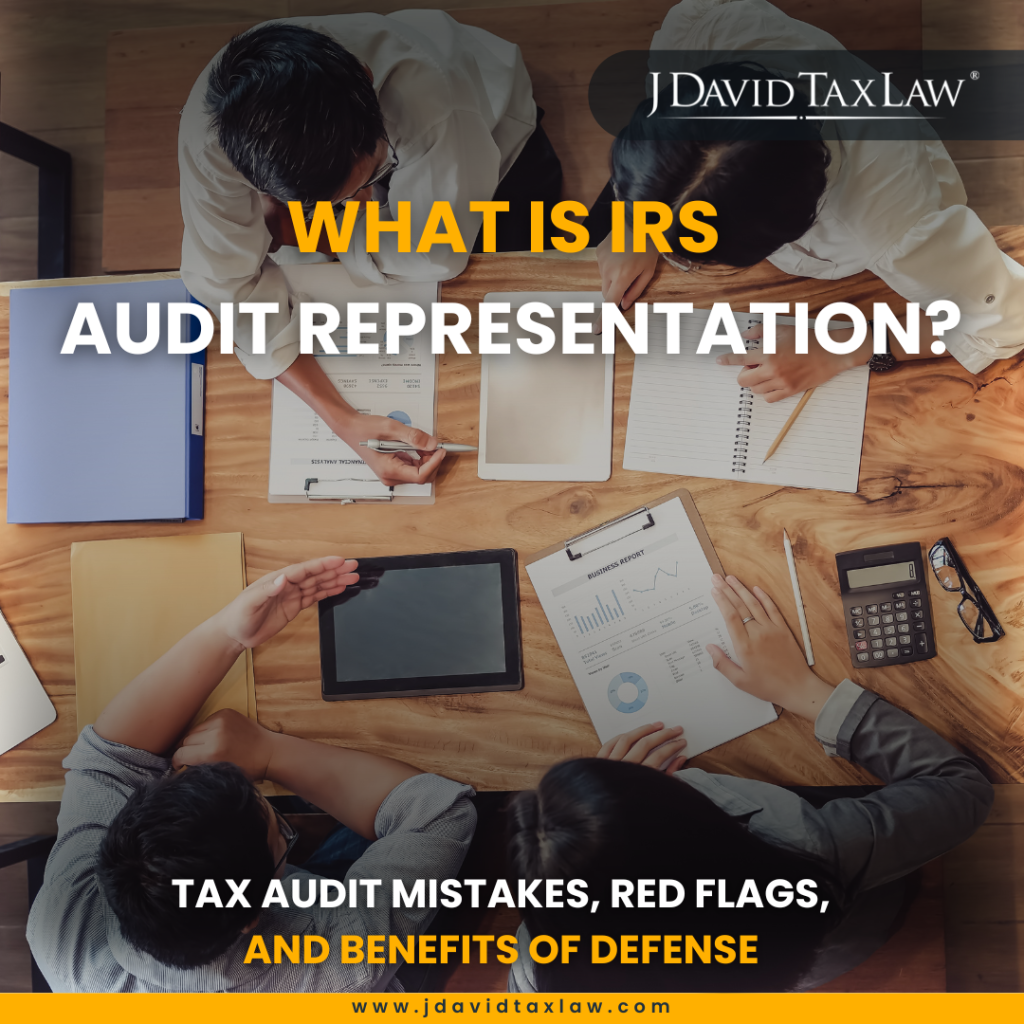Audits are one of the most stressful actions the IRS can take against a taxpayer. In 2024, the IRS conducted more than 500,000 audits, leading to nearly $30 billion in additional tax assessments. While fewer than 1% of individual returns are audited, the risk rises sharply for high earners, businesses, and those with complex filings. Facing the IRS alone can lead to costly mistakes—professional IRS audit representation provides the protection and strategy necessary to achieve the best outcome.
Key Takeaways
- IRS audit representation allows a licensed professional (tax attorney, CPA, or enrolled agent) to act on your behalf.
- Common mistakes include falling for IRS red flags, poor documentation, and self-representation.
- Businesses face unique challenges compared to individuals, often living with the constant fear of IRS audit as a business owner.
- Preparation reduces risk—such as filing accurately and on time, since the best time to file taxes to avoid audit is before errors pile up.
Audit defense by a professional can minimize penalties, shorten timelines, and secure fair outcomes.
IRS Audit Representation
IRS audit representation is the process of having a licensed professional — a tax attorney, CPA, or enrolled agent — act on your behalf during an IRS audit. With a signed Power of Attorney (Form 2848), your representative communicates directly with the IRS, prepares and organizes documentation, responds to requests, and negotiates resolutions. This allows you to step back from the process while ensuring that every aspect of the audit is managed by someone who understands IRS procedures and your legal rights.
What Common Mistakes To Avoid During IRS Audit Representation?
Taxpayers often make errors that can worsen their audit experience:
- IRS red flags such as inflated charitable deductions, inconsistent income reporting, or questionable credits.
- Reporting 1099 income on Schedule C (Form 1040) improperly, which frequently triggers IRS scrutiny.
- Overstating auto deductions for rental property, one of the most common IRS tax audit red flags.
- Missing deadlines or failing to respond to IRS letters.
- Attempting self-representation without the training to anticipate IRS questions.
Takeaway: Avoiding these mistakes protects your credibility and prevents your case from escalating unnecessarily. Read here why you shouldn’t face the IRS alone.
How Does IRS Audit Representation Differ for Individuals vs. Businesses?
- Individuals are typically audited for issues like unreported income, lifestyle audits, or deduction irregularities.
- Businesses face broader scrutiny, including payroll reporting, depreciation, and large expense categories. For many, there is a constant fear of IRS audit as a business owner, given how audits can expand across multiple years or related entities.
- Outcome stakes are higher for businesses, where errors can lead to steep penalties or even criminal exposure.
The IRS is Forgiving Millions Each Day. You Could Be Next.
Steps in Preparing for an IRS Audit Representation
Preparation begins before the IRS audit meeting:
- Review the IRS audit letter to understand the issues raised.
- Collect documentation—tax returns, receipts, bank records, and contracts.
- Identify potential weaknesses or IRS audit triggers that the IRS may question.
- Organize evidence clearly to support reported deductions and income.
- Coordinate with your representative to develop a defense strategy.
Pro Tip: The best time to file taxes to avoid audit complications is early and accurately, reducing errors that can attract IRS attention.
What Are the Key Benefits of Hiring a Professional for IRS Audit Representation?
-
Audit defense: A professional can challenge IRS findings, present documentation effectively, and negotiate reduced liabilities. Check our strategic audit defense tips here!
-
Legal protection: Tax attorneys provide attorney–client privilege, ensuring sensitive information stays confidential.
-
Efficiency: Representatives streamline the process, respond promptly, and prevent delays.
-
Peace of mind: You are shielded from direct IRS questioning and pressure.
Together, these benefits deliver measurable results. Our firm has collectively saved clients more than $1.9 million in IRS audit representation through reduced penalties, fair negotiations, and strategic defense.
How Do IRS Audit Representation Services Work?
IRS audit representation services follow a structured process:
-
You authorize representation by signing Form 2848 (Power of Attorney).
Your representative takes over all IRS communication.
They review your return, identify weaknesses, and gather documentation.
They attend meetings, present evidence, and negotiate outcomes.
If necessary, they pursue appeals or settlements.
Representation transforms an IRS tax audit from a direct confrontation into a guided legal defense managed by experts.
Choosing the Right IRS Audit Representative
The right representative can make the difference between a fair resolution and significant penalties. Look for:
Licensure (Tax Attorney, CPA, or Enrolled Agent).
Demonstrated experience in audit defense.
Clear communication and transparency.
A proven track record of favorable outcomes.
Our experienced tax attorneys at J. David Tax Law are authorized to represent you directly before the IRS and handle every aspect of your audit from start to finish. Contact us today for a free tax consultation.
Conclusion
An IRS audit requires experienced representation. A tax attorney, CPA, or enrolled agent can manage the process for you, anticipate audit triggers and red flags, and protect your rights whether you are an individual or a business. With professional guidance, you reduce penalties, limit exposure, and achieve the most favorable resolution possible.
Do you want to know your chances of being audited in 2025? Speak with our tax attorneys today to understand your risk and protect your rights before the IRS acts.





















